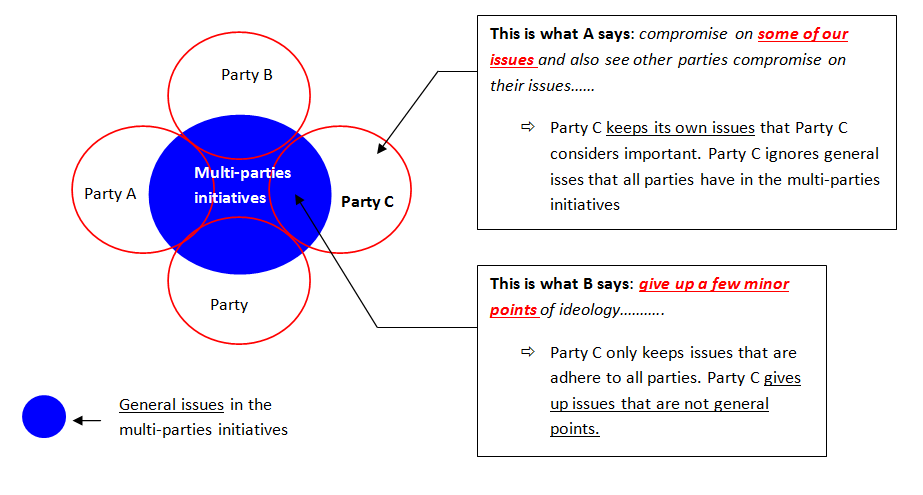mattce wrote:
Bump...
Can't anyone please clarify why A is wrong?
I understand why B is correct; and might even agree that it could possibly be better than A... But I don't understand why A is incorrect.
.. Or is A correct but just less correct than B?
Any clarification would be great

Because the original question has some errors, I will quote the complete version below for more discussion.
Quote:
Multi-party initiatives are becoming increasingly popular among the members of the parliament of Country W. Although legislation proposed under the auspices of more than one party may not adhere as strictly to the agenda of each of the parties involved as legislation proposed by only one party, the political backing of the voting blocs represented by the cooperating parties make such proposals more likely to pass than proposals that come from a single faction alone. The benefit of multi-party initiatives is that legislation important to the general welfare of Country W that might otherwise have foundered in inter-party disagreements can effectively be enacted.
Which of the following statements by a minister of Party C in the government of Country W is most consistent with the beliefs of an individual political party in the situation described above?
A) "Our party would rather compromise on some of our issues and also see other parties compromise on their issues than run the risk of not having legislation that we propose pass."
B) "Our party would rather give up a few minor points of ideology than risk having the issues important to our constituents not be addressed as a result of the government's inability to pass any new laws. "
C) "Our party would rather participate in an environment that fosters inter-party cooperation than persist in constant conflict with other parties."
D) "Our party would rather have other parties join in support of our legislation than join in supporting the proposals of other parties."
E) "Our party would rather have our proposals passed because they represent what is best for the welfare of our country than to become engaged in the agendas of other parties."
ANALYZE THE STIMULUS:Proposal X under the multi-parties initiatives may not adhere as strictly to the agenda of each of the parties involved as legislation proposed by only one party.
However, this proposal is more likely to pass than proposals that come from a single faction alone.
==> The benefit of multi-party initiatives is that legislation X can effectively be enacted.
==> Multi-party initiatives are becoming increasingly popular
The correct answer will have to demonstrate the relationship: Proposal X [under multi-parties initiatives] that
comprise issues of multi-parties ==> Proposal X may not adhere as strictly to the agenda of each of the parties ==> have benefit for multi-parties ==> more likely to pass
ANALYZE EACH ANSWER:C, D, E are out immediately because:
C) "Our party would rather participate
in an environment that fosters inter-party cooperation than persist in constant conflict with other parties."
Wrong. Clearly out of scope.
D) "Our party would rather have
other parties join in support of our legislation than join in supporting the proposals of other parties."
Wrong. Clearly out of scope.
E) "Our party would rather have our proposals passed because they represent what is best for the welfare of our country than to become engaged in the agendas of other parties.
Wrong. Does not show the benefit for multi-parties.
Between A & B, which one is correct?A is
WRONG. Only
B is correct. Please see explanation in the image attached.
Attachments

Untitled1.png [ 42.66 KiB | Viewed 15772 times ]



 95%
(hard)
95%
(hard)
 62%
(02:58)
wrong
62%
(02:58)
wrong  based on 856
sessions
based on 856
sessions


